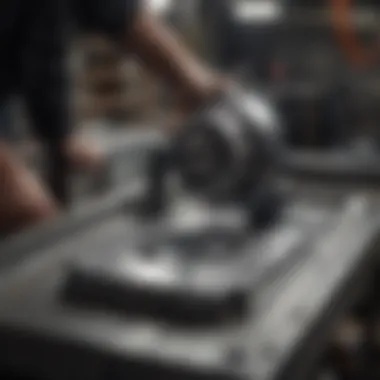Understanding Anodes for Aluminum Boats: A Guide


Intro
In the world of boating, maintaining the health of your vessel is not just a matter of routine checks and aesthetic upgrades. It also involves understanding the chemistry that affects your boat's longevity, particularly when it comes to aluminum. One often overlooked aspect that plays a significant role in this is the use of anodes. Specially designed to combat galvanic corrosion, anodes can make all the difference for boat owners looking to preserve their investments.
When an aluminum boat is moored or anchored, it becomes part of a larger maritime ecosystem, interacting with other metal structures, water currents, and environmental factors. This creates an intricate web of electrochemical reactions that can jeopardize your boat's integrity. The purpose of this guide is to shed light on these complexities surrounding anodes, exploring the various types available, their functions, and best maintenance practices. Whether you're a seasoned sailor or a novice eager to learn, this comprehensive overview will enhance your understanding and help protect your aluminum vessel.
Performance Metrics
Understanding how anodes function ties into the broader theme of performance metrics. In the context of aluminum boats, performance is assessed not just by speed and fuel consumption, but also by durability and resistance to wear and tear over time. Two critical aspects that often come into play here are fuel efficiency and handling stability.
Fuel Efficiency
Effective use of anodes can lead to improved fuel efficiency. When corrosion occurs, it creates rough surfaces on the boat's hull, leading to increased drag in the water. With well-maintained anodes, your hull remains smooth and free from the detrimental effects of corrosion, allowing your boat to glide through the water more efficiently. Thus, investing in the right anodes can save you money in fuel costs over the long haul.
Handling and Stability
Just like the way a car's alignment affects its handling, the integrity of your boat’s hull can significantly impact its stability on the water. A corroded hull can change the weight distribution and balance of your vessel, which may lead to difficulty in steering and understanding water conditions. By safeguarding your boat with suitable anodes, you help maintain the optimal shape and weight distribution necessary for smooth sailing.
Car vs Boat Considerations
While it may seem odd to compare boats directly with cars, the principles of investment value and long-term ownership are remarkably similar. For anyone pondering the merits of an aluminum boat, there are some critical considerations on value retention and manufacturer reputation that come to the fore.
Value Retention and Depreciation
Aluminum boats often hold their value exceptionally well compared to their fiberglass or wooden counterparts. A well-maintained aluminum boat outfitted with proper anodes can exhibit less depreciation over time. Buyers often look for vessels that show signs of care, and a boat without excessive corrosion or wear in key areas will certainly fetch a better price on the resale market.
Manufacturer Reputation Analysis
The choice of anode materials and the overall build quality of an aluminum boat can vary significantly depending on the manufacturer. Before making a decision, it's essential to investigate brands and their history in marine technology. Some manufacturers are known for their commitment to corrosion-resistant designs, while others may fall short. Conducting your research can ensure that you are not only investing in a quality vessel but also in the right protective measures against corrosion.
As a boat owner, understanding the value and function of anodes can save you more than just maintenance costs; it can save your peace of mind.
Preamble to Anodes
When it comes to preserving the integrity of aluminum boats, anodes play a crucial role that shouldn’t be taken lightly. They are, in essence, the guardians against corrosion, a natural enemy that tirelessly seeks to break down metals exposed to water environments. Understanding anodes is not just for the seasoned mariner; it's a must for anyone interested in maintaining the longevity and performance of their vessel.
In simple terms, anodes are sacrificial components that help protect more critical metal parts of the boat from corrosion. Positioned strategically on the boat, they endure the brunt of the corrosive process, thereby extending the lifespan of the aluminum itself. This function is increasingly important in our waters, which can often be teeming with minerals, salt, and even industrial pollutants.
The selection and maintenance of anodes can make the difference between a smooth-sailing experience and unexpected breakdowns or repairs. Knowledge about anodes covers aspects like their types, the mechanisms behind galvanic corrosion, and installation methodologies. For boat owners, this information is essential for proper care of their investment, safeguarding their vessels from potential wear that could lead to costly replacements or repairs.
Here's a brief overview of what will be covered in the upcoming sections:
- What exactly anodes are and how they function in providing vital protection.
- The significance of using anodes, particularly in a marine environment where conditions can be harsh and unforgiving.
What are Anodes?
Anodes are specialized pieces of metal made from materials like zinc, magnesium, or aluminum, designed to corrode instead of the more critical parts of an aluminum boat. When submerged, different metals can create an electrochemical reaction, leading to corrosion. To combat this, anodes serve as sacrificial elements — instead of the hull corroding and sustaining damage, it’s the anode that deteriorates over time.
It might sound a bit counterintuitive to intentionally add pieces that will corrode, but the science is sound. By sacrificing themselves, anodes prevent other components from corroding, prolonging the life of your boat's critical metal structures. They come in various forms, such as plates, blocks, and rod shapes, and are typically attached to the boat's hull or components such as the propeller.
Importance of Anodes in Marine Environment
The marine environment can be quite a challenging arena. Saltwater, in particular, is notorious for accelerating corrosion processes. This is where the importance of anodes cannot be overstated — they are essentially an insurance policy against the ravages of time and the elements.
There are a few key points regarding the significance of anodes:
- Protection Against Corrosion: The main function is to protect your aluminum boat from the effects of galvanic corrosion. If not properly managed, corrosion can eat away at the vessel over time, compromising its integrity.
- Cost Savings: Taking the time to select the appropriate anodes and maintain them can save money in repairs or even total boat replacements. Dealing with corrosion early on is far less expensive than extensive repairs later.
- Safety: A corroded boat is not just unsightly; it can also be dangerous. Regular checks on your anodes and their replacement ensure that the boat remains safe for all users.
The impact of anodes on aluminum boats is profound. By understanding their utility, boat owners can take proactive measures in preserving their vessels, ensuring a smooth and safe experience on the water.
Types of Anodes for Aluminum Boats
When it comes to aluminum boats, choosing the right type of anode can mean the difference between a vessel that stands the test of time and one that succumbs to the wear and tear of the marine environment. Anodes play a critical role in protecting boats from galvanic corrosion, a slow yet insidious process that can do serious damage over time. In this section, we will explore the three primary types of anodes—Zinc, Magnesium, and Aluminum—shedding light on their specific characteristics, advantages, and the nuances involved in their selection.
Zinc Anodes
Zinc anodes have been a staple in marine protection for decades. Most often made from a combination of zinc and other metals, these anodes are known for their effectiveness when in saltwater, which is where they shine. Their function as a sacrificial element means they corrode first, sparing the metal parts of your boat.


One of the key benefits of zinc anodes is their availability and cost-effectiveness. For boat owners looking for a reasonable solution to protect their vessels, zinc anodes might be the best bet. They are also relatively easy to install and replace, making them a practical choice for those who prefer to do maintenance work themselves. However, it’s worth noting that zinc is less effective in freshwater environments. If your aluminum boat is predominantly used in a freshwater setting, you might want to look at other options.
Magnesium Anodes
Magnesium anodes are typically favored for freshwater applications. They provide a higher galvanic potential compared to zinc, which helps them to corrode first, protecting your precious aluminum boat. One standing out factor about magnesium anodes is their superior performance in fresh water, making them an ideal preference for lakes and rivers.
These anodes tend to be lighter and more economical, but they can also degrade faster in saltwater, potentially leading to costly damage if used improperly. Therefore, understanding where your boat predominantly operates is crucial before going with magnesium anodes.
Moreover, it’s not uncommon for boat owners to overlook magnesium's unique needs—often falling into the trap of using zinc anodes in lakes, which is not optimal. To put it simply, if your boat spends more time in freshwater, magnesium is the way to go.
Aluminum Anodes
Aluminum anodes are a relatively newer option compared to zinc and magnesium. They present a unique advantage, as they are specifically designed to be used with aluminum boats. Unlike zinc and magnesium, which can cause complications due to the metals' varying potentials, aluminum anodes are engineered to be compatible with aluminum hulls.
One of the major advantages of aluminum anodes is their longevity. They tend to have a significantly longer life span than their counterparts, which may lead to less frequent replacement. They also perform well in both salt and freshwater, making them versatile for boaters who move between different environments.
Members of the marine community sometimes underestimate the effectiveness of aluminum-based solutions. However, they offer another compelling option for those looking to maximize the lifespan of their aluminum boat.
Understanding the differences between these anode types can empower aluminum boat owners to make an informed decision tailored to their unique marine environment. Remember that the best choice often hinges on where you operate your vessel and your specific maintenance preferences.
Understanding Galvanic Corrosion
In the realm of aluminum boats, the specter of galvanic corrosion stands as a significant concern. This natural process threatens the integrity of vessels, making it vital for boat owners to grasp its mechanics. Effective understanding not only empowers mariners to protect their investments but also informs them about the importance of anodes in mitigating corrosion challenges.
What is Galvanic Corrosion?
At its core, galvanic corrosion occurs when two different metals are electrically connected in a conductive solution, such as seawater. This electrochemical reaction leads to one of the metals corroding at an accelerated rate. Think of it as a duel between metals: one emerges victorious while the other faces deterioration. Typically, in the case of aluminum boats, more noble metals, like copper or stainless steel, can turn into perpetrators of corrosion when they are in contact with aluminum.
Essentially, aluminum becomes the anode in this scenario, sacrificing itself to protect the more noble metal. It becomes intertwined with the boat's functionality, which can cause significant issues if not properly managed. Understanding this interaction can spare boat owners from costly repairs down the road and help them maintain the structural integrity of their vessels.
Mechanisms of Corrosion in Aluminum Boats
The mechanisms behind galvanic corrosion can be broken down into a few key elements:
- Electrochemical Reactions: When aluminum is exposed to water, it begins to oxidize. This leads to the formation of aluminum oxide—a tough substance, but once the protective layer is compromised, corrosion sets in. Consider it a shield that can crack and leave the metal vulnerable.
- Electrical Conductivity: Seawater, containing various salts and minerals, serves as a perfect electrolyte for facilitating corrosion. Its conductivity enhances the electrochemical process, making aluminum highly susceptible to corrosion when in contact with dissimilar metals.
- Anodic Protection: The use of anodes— typically made from zinc, magnesium, or aluminum—plays a crucial role here. These metals act as sacrificial anodes, corroding in lieu of the aluminum structure. It's like having a security guard who takes the hits instead of the valuable asset they protect.
In summary, the mechanics of galvanic corrosion involve a delicate balance between protection and vulnerability among different metals. Awareness of how these processes interact is a significant advantage for any aluminum boat owner, ensuring the longevity and performance of their craft.
"Understanding galvanic corrosion isn't just a matter of knowledge; it's about employing strategies for preservation in a world where threats lurk beneath the surface." - Anonymous
As the maritime industry evolves, new insights into corrosion and its management emerge. By embracing a comprehensive understanding of these concepts, boat owners can maintain their vessels, safeguarding them against the lurking dangers of corrosion.
Choosing the Right Anode for Your Boat
Selecting the appropriate anode for your aluminum boat is akin to choosing the right fuel for a high-performance engine. The wrong choice can lead to accelerated corrosion, not to mention costly repairs and downtime. When navigating the vast ocean of anode options, understanding the nuances helps to extend the life of your vessel significantly.
The right anode can act as a guardian, sacrificing itself to protect valuable structures like the hull and other metallic components. As you ponder choices, keep in mind that several factors come into play when making your decision. A well-informed selection directly correlates to boat maintenance, safety, and overall efficiency. Always approach this choice with careful consideration, as it has far-reaching repercussions on your boat’s longevity.
Factors Affecting Anode Selection
When it comes to selecting an anode, various elements can shape your decision:
- Water Composition: Different water types, whether freshwater or saltwater, demand specific materials. For instance, magnesium anodes work better in freshwater and tend to corrode effectively in that environment. Sea water, with its higher salinity, benefits more from zinc anodes.
- Boat Size and Type: A larger vessel may require multiple anodes, strategically placed in locations like the transom or bow. Smaller crafts can sometimes get away with just one well-placed anode, but don't let that fool you. Each boat's type, whether a pontoon or a yacht, can dictate the suitable anode material and style.
- Operating Conditions: Environmental conditions matter. If you regularly dock near industrial areas or marinas, the presence of stray currents can affect the type of anode required. Not considering this can lead to subpar protection and more frequent replacements.
- Coatings and Antifoulants: The finish on your boat can interfere with how anodes perform. Certain paints or coatings can insulate the anode, inhibiting its function, rendering the investment practically wasted. Therefore, it’s wise to check compatibility beforehand.
These factors aren’t mere suggestions; they are essential aspects that boat owners need to consider to protect their investment effectively.
Common Mistakes in Anode Selection
Even seasoned boaters can trip over some common blunders when selecting anodes. Here are a few pitfalls to avoid:
- Ignoring Water Type: As mentioned, it is crucial to choose an anode suited to the specific water environment. A zinc anode in fresh water is a recipe for early failure, while magnesium in saltwater is equally misguided.
- Neglecting Recommendations: Users often overlook the manufacturer’s guidelines, which provide insights tailored to specific boat models. Ignoring these can lead to poor performance and potential damage.
- Underestimating Replacement Frequency: Boat owners sometimes don't realize how quickly anodes can wear out. Regular inspections are vital. An anode that’s too far gone won’t do its job, so staying on top of replacements can save headaches down the line.
- Focusing Solely on Price: While it’s tempting to snatch up the cheapest option, remember that quality matters in the long run. Investing a little more upfront can prevent extensive corrosion costs later.
"Choosing the right anode is more than just a box-checking exercise; it's a commitment to preserving your boat's integrity."
In sum, adeptly navigating the choices related to anodes not only protects your vessel but also enhances your boating experience overall. By keenly understanding factors impacting selection and avoiding common mistakes, you’ll be well on your way to ensuring that your aluminum boat remains safeguarded from the ravages of water and time.
Installation of Anodes


When it comes to keeping aluminum boats protected from the pernicious effects of galvanic corrosion, the role of anodes cannot be overstated. Proper installation is key to maximizing their effectiveness, ensuring that your vessel remains in prime condition. Anodes act like sacrificial protectors, giving themselves up to corrosion so that your boat’s critical parts can enjoy a longer lifespan. By understanding the installation nuances, boat owners can sidestep costly repairs and extend their time on the water.
Best Practices for Installing Anodes
To truly safeguard your vessel, adhering to best practices during anode installation is paramount. Here are some guidelines to keep in the back of your mind:
- Select the Right Type: Always match the anode material to the water conditions and boat type. This prevents premature failure and ensures optimal protection.
- Clean the Surface: Before installation, ensure that the area where the anode will be attached is free of any corrosion, dirt, or paint. A clean surface promotes better conductivity, allowing the anode to function effectively.
- Correct Positioning: Position the anode in a location where water can flow over it freely. This not only enhances its efficiency but also allows it to dissipate corrosion away from vital areas.
- Secure the Anode Properly: Use appropriate hardware and ensure the anode is firmly attached. A looser fit can reduce conductivity and leave areas vulnerable.
- Check with Manufacturer Guidelines: Different boat designs may require tailored approaches to installation. Always consult the manufacturer’s instructions where available.
By following these practices, you'll be laying a strong foundation for your vessel's protection against corrosion.
Tools and Materials Required
Before diving into installation, make sure you have the necessary tools and materials at hand. Here’s a handy list:
- Anodes (Zinc, Magnesium, or Aluminum) depending on the boat’s needs and environmental conditions.
- Wire Brush: For cleaning installation sites.
- Drill and Drill Bits: To attach the anodes securely.
- Wrenches and Sockets: For tightening bolts and securing the anodes in place.
- Marine-Grade Sealant: To protect against water ingress in drilled areas.
- Safety Gear: Gloves and goggles should always be worn to protect from sharp edges and debris.
Having these materials right at your fingertips can make the installation process seamless and effective. Whether you are a seasoned boat owner or a newcomer, understanding these tools simplifies the task ahead.
"A stitch in time saves nine." Ensuring that your anodes are properly installed can save you significant headaches and expenses down the road.
Maintenance of Anodes
Proper maintenance of anodes is the cornerstone of ensuring that aluminum boats remain protected from the destructive forces of galvanic corrosion. Just like a ship’s hull is the body that carries it through tempestuous waters, anodes are its invisible guardians. Regular maintenance not only prolongs the lifespan of these protective devices but also enhances overall boat durability and safety.
A well-maintained anode prevents marine growth and other corrosive processes from harming the hull. Imagine setting sail with the wind at your back, only to discover that corrosion has weakened your vessel’s structure, potentially leading to costly repairs or, worse, complete loss of the boat. The cost of replacing anodes is minor compared to the extensive damage that poorly maintained anodes can cause. Regular upkeep ensures that your investment—your boat—remains seaworthy and reliable.
Frequency of Inspection and Replacement
When it comes to aluminum boats, anodes should not be treated as a set-it-and-forget-it component. These small but mighty devices require frequent inspection. For most recreational boaters, a quarterly check is a good rule of thumb. Anodes located in areas subject to water turbulence or high salinity might wear out faster, necessitating more regular checks, perhaps even monthly during peak seasons.
- Best Practices for Inspection:
- Visually inspect the condition of the anodes during cleaning and maintenance of the boat.
- Use a caliper or a ruler to measure the thickness of the anodes. When they are reduced to half their original size, it’s time to replace them.
- Look for unusual signs, such as cracking or pitting, which are clear indicators that the anode is reaching the end of its life.
Regular checks on anodes can avert potential mishaps that may arise from unseen wear and tear.
Signs of Anode Wear and Failure
Understanding the signs that indicate anode wear is critical for every boat owner. It can be likened to spotting a leak before it turns into a flood. Ignoring these signs can result in much more than mere inconvenience; it can lead to serious structural issues. Some common signs of anode wear include:
- Visual Damage: Look for significant pitting or chunks missing from the surface of the anode. These physical changes often signify that the anode is approaching its expiration.
- Unusual Corrosion Patterns: If the hull starts to show unexpected corrosion, it might indicate that the anode has failed to do its job effectively.
- Loss of Mass: If you notice that an anode seems unusually light or thin upon inspection, it could be on its last legs.
Maintaining awareness of these signs will empower boat owners to act before a problem balloons into a major repair expense. Early detection is key to keeping your aluminum boat sailing smoothly for years to come.
Innovations in Anode Technology
As the maritime industry evolves, so does the technology behind protecting aluminum boats from corrosion. Innovations in anode technology are key to ensuring boats remain seaworthy and can withstand the elements over time. This section delves into recent advancements that not only enhance the durability of anodes but also cater to environmentally-conscious practices. Understanding these innovations allows boat owners to make informed decisions, optimizing both performance and sustainability.
New Materials and Fabrics
Traditionally, anodes have been constructed from materials like zinc or magnesium. However, emerging materials are reshaping the landscape of cathodic protection. One noteworthy development is the creation of composites that combine lightweight properties with high corrosion resistance. These new materials can outperform traditional options, offering longer service lives and reducing the frequency of replacements.
Moreover, environmentally friendly anode materials crafted from alloys that minimize toxic metals are gaining traction. By using materials that can still provide effective protection without harming aquatic ecosystems, manufacturers are addressing both performance and environmental concerns.
- Corrosion-Resistant Alloys: Newer alloys offer enhanced protection while reducing harmful environmental impact.
- Composite Materials: Lightweight and robust, these anodes can lead to improved boat performance.
Boat owners searching for effective anodes should consider these advanced materials. Not only do they ensure better longevity, but they also contribute to the overall sustainability of marine activities, a growing concern in today’s eco-conscious world.
Smart Anode Systems
The dawn of smart technology has seeped into the domain of marine protection, notably in the form of smart anode systems. These systems are equipped with sensors that monitor the state of anodes in real-time. By providing feedback on wear and performance, boat owners can be proactive rather than reactive.
Imagine a scenario where your boat's anode system alerts you when it's nearing the end of its life. This means you can avoid unexpected failures and costly repairs while maximizing the efficiency of your vessel.
Benefits include:
- Real-Time Monitoring: Keep track of anode health and corrosion rates.
- Data Analysis: Use collected data to determine the best times for maintenance, ultimately saving money and time.
- Customized Performance: Adjustments can be made based on specific environmental factors impacting each boat.


Investing in smart anode systems makes sense for the tech-savvy boat owner. These systems provide peace of mind and drive home the importance of maintaining metallic integrity in your vessel, combining technology and practicality in a field where both are essential.
"Innovative anode technology transforms traditional boating practices, enabling better protection and environmental stewardship."
As the innovations in anode technology continue to burgeon, the commitment to improving marina life experience goes hand in hand with sustainable practices. For boat enthusiasts, staying abreast of these advancements can yield significant advantages in performance, longevity, and eco-friendliness, ensuring that their vessels are not only protected but are also part of a larger responsibility toward the environment.
Regulatory and Environmental Considerations
Understanding the regulatory frameworks and the environmental ramifications surrounding anodes is crucial for boat owners navigating both the waters of performance and compliance. With aluminum boats being prevalent in marine activities, their maintenance and environmental footprint draw scrutiny from various stakeholders, making it imperative to align best practices with regulatory mandates.
Environmental Impact of Anodes
Anodes, while essential for protecting aluminum boats from galvanic corrosion, come with their own set of environmental concerns. Depending on the materials used, such as zinc or magnesium, the leaching of metals into the water can have detrimental effects on aquatic life. For instance, zinc, while effective in preventing corrosion, can be toxic to marine organisms in higher concentrations. The shift towards more environmentally friendly anodic materials, such as aluminum anodes, showcases a growing awareness of these impacts. Not only do aluminum anodes minimize harmful runoff, but they also maintain effectiveness in corrosion prevention.
The conversation about environmental impact doesn't stop with the type of anode. It involves the handling and disposal of worn-out anodes. Many boaters may be unaware that improperly discarded anodes can contribute to local pollution. Therefore, adhering to best practices like recycling and responsible disposal is part of a broader commitment to safeguarding marine ecosystems.
"Choosing the right anode material is not just about performance; it’s a step towards sustainable boating practices."
Compliance with Maritime Regulations
Compliance with maritime regulations is another key pillar in the discourse surrounding anodes for aluminum boats. Various governing bodies have laid down guidelines to ensure that marine activities do not compromise water quality and aquatic life. Regulations around the materials used in anodes often stem from broader environmental policies aimed at conservation and pollution control.
For boat owners, being well-versed in these regulations isn’t just about avoiding penalties; it’s about fostering a culture of responsibility within the boating community. Familiarity with local laws, such as those set forth by the Environmental Protection Agency (EPA) in the United States, can empower boaters to make informed decisions regarding anode selection and usage.
Some considerations that boaters should take into account include:
- Material Sourcing: Understanding where and how the anodes are produced can shed light on their environmental impact.
- Impact Assessments: Regularly evaluating the influence of your boat's anodes on the local environment can be a prudent practice.
- Reporting and Regulations: Staying updated on changes in local maritime regulations ensures compliance and promotes community engagement in conservation efforts.
In essence, a keen understanding of not only the functions of anodes but also the regulatory landscape enhances the ability to make decisions that are informed and beneficial for both the boat owner and the broader marine ecosystem.
Case Studies in Anode Applications
Case studies are vital in understanding how anodes function in real-world applications, especially when it comes to aluminum boats. The experiences of boat owners, whether they encountered triumphs or tribulations, provide invaluable insights. These narratives inform new boaters about potential pitfalls and advantages of choosing specific anode types. Taking time to assess these case studies can help guide decision-making and enhance the overall longevity of one’s vessel.
Success Stories from Boat Owners
One critical aspect of effective anode usage is success stories from the field. For instance, a yacht owner in Florida shared his experience with replacing zinc anodes. Previously, he faced severe deterioration of his hull, which was attributed to subpar anode performance. After conducting thorough research, he switched to aluminum anodes. Remarkably, he noticed a decrease in corrosion rates, ultimately extending the lifespan of his boat.
- Efficiency: This tale illustrates how a well-chosen anode can drastically alter an owner's maintenance routine.
- Cost-Effectiveness: Over several seasons, this owner calculated that the investment in quality anodes saved him from urgent repairs and expensive replacements.
Moreover, another boat enthusiast from the Pacific Northwest found herself wrestling with galvanic corrosion issues. Upon switching from magnesium to robust aluminum anodes, she reported a distinct improvement in efficiency and protection. Here’s what she noted:
"The change in how my boat performed was like night and day, and I realized it wasn't merely a cost issue but a matter of safeguarding my investment."
These success stories echo a common theme—that investing time to understand anodes directly correlates with better boat performance and maintenance efficiency.
Lessons Learned from Failures
Not all experiences with anodes are positive. It's crucial to learn from failures as they often reveal glaring pitfalls. One boat owner opted for low-cost anodes without prior research. His decision soon backfired as the cheap materials did not hold up against corrosive saltwater. Within just a short span, his boat required extensive and costly repairs.
- Avoiding Hasty Decisions: This case serves as a stark reminder to prioritize quality over cost.
- Impact of Environment: Different water conditions necessitate different types of anodes, which this owner learned the hard way.
Another cautionary tale involves a group of recreational fishers who neglected regular inspections on their anodes. They presumed all would be fine, only to discover after a serious outing that the anodes had corroded away. This led to visible signs of corrosion on their boat's hull.
This scenario reiterates the importance of regular maintenance and inspections as well as adhering to standard practices in anode care to prevent unnecessary wear and tear.
In summary, case studies not only serve as victorious tales of boat ownership but also bear warnings of potential oversights. Gathering knowledge from both successes and failures can arm boat enthusiasts with practical lessons that nurture informed decisions regarding anodes and, consequently, the longevity of their vessels.
Closure and Future Directions
In reflecting upon the intricate tapestry of anodes and their role in protecting aluminum boats, it becomes clear that understanding these components is not merely a technicality but a critical necessity. The longevity and performance of your vessel hinge on the proper application and maintenance of anodes. As we summarize the key insights, we see the importance of not only recognizing the types of anodes available—be it zinc, magnesium, or aluminum—but also grasping how they interact with the marine environment, thus safeguarding your boat against the ravages of galvanic corrosion.
Summarizing Key Insights
Through the course of this guide, we have shed light on various elements that are pivotal for boat owners and enthusiasts:
- Types of Anodes: Each material serves a specific purpose and is suited to different water conditions. Zinc offers cost-effectiveness in saltwater, while magnesium is your go-to for freshwater.
- Installation and Maintenance: Correct installation practices contribute significantly to the functionality of anodes. Keeping an eye on their wear and tear helps in timely replacements, ensuring ongoing protection against corrosion.
- Innovations in Anode Technology: With ongoing research, smart anode systems and new materials are paving the way for enhanced durability, enabling boaters to focus more on their adventures rather than their boat's maintenance.
- Regulatory Considerations: Keeping abreast of compliance with maritime regulations protects marine ecosystems and promotes responsible boating practices.
"Anodes aren’t just accessories; they are shields of durability against unseen foes like corrosion."
The Future of Anodes in Maritime Industry
Looking ahead, the maritime industry stands on the precipice of transformation, particularly regarding anode technology. Several trajectories indicate how this sector may unfold:
- Sustainable Practices: As environmental consciousness rises, we can expect a surge in biodegradable and recyclable materials for anodes, lessening their ecological footprint while maintaining effectiveness.
- Smart Technologies: The rise of sensor-equipped anodes will revolutionize how we monitor corrosion levels, providing real-time feedback and enhancing decision-making about maintenance.
- Research Advancements: Ongoing studies into corrosion science will likely yield even more innovative solutions, contributing to the overall longevity of aluminum vessels while promoting best practices in the marine field.



